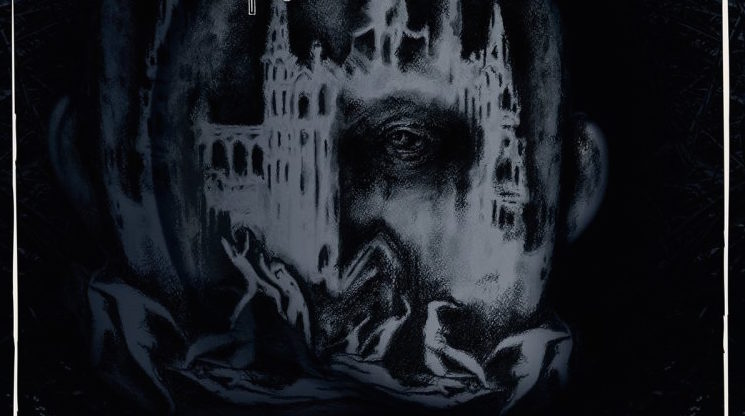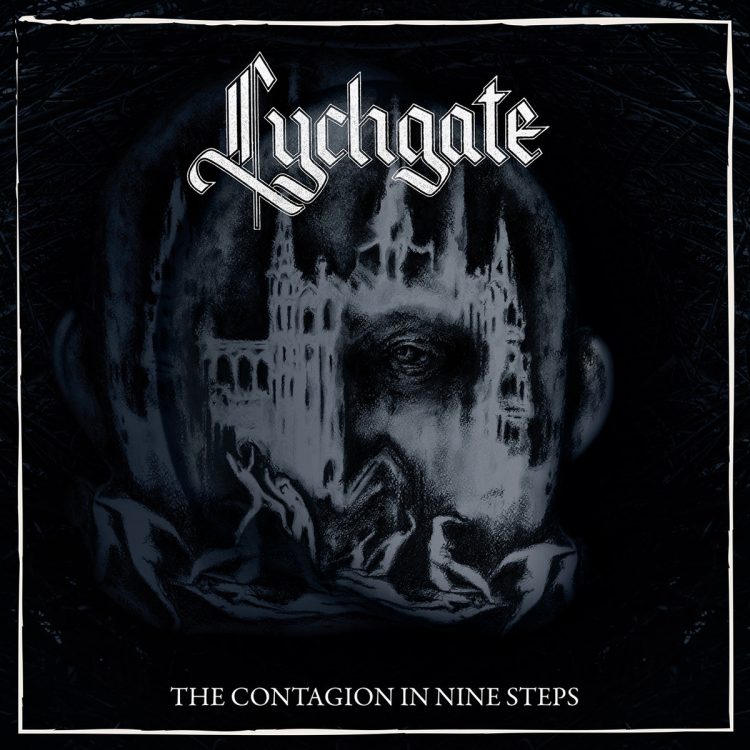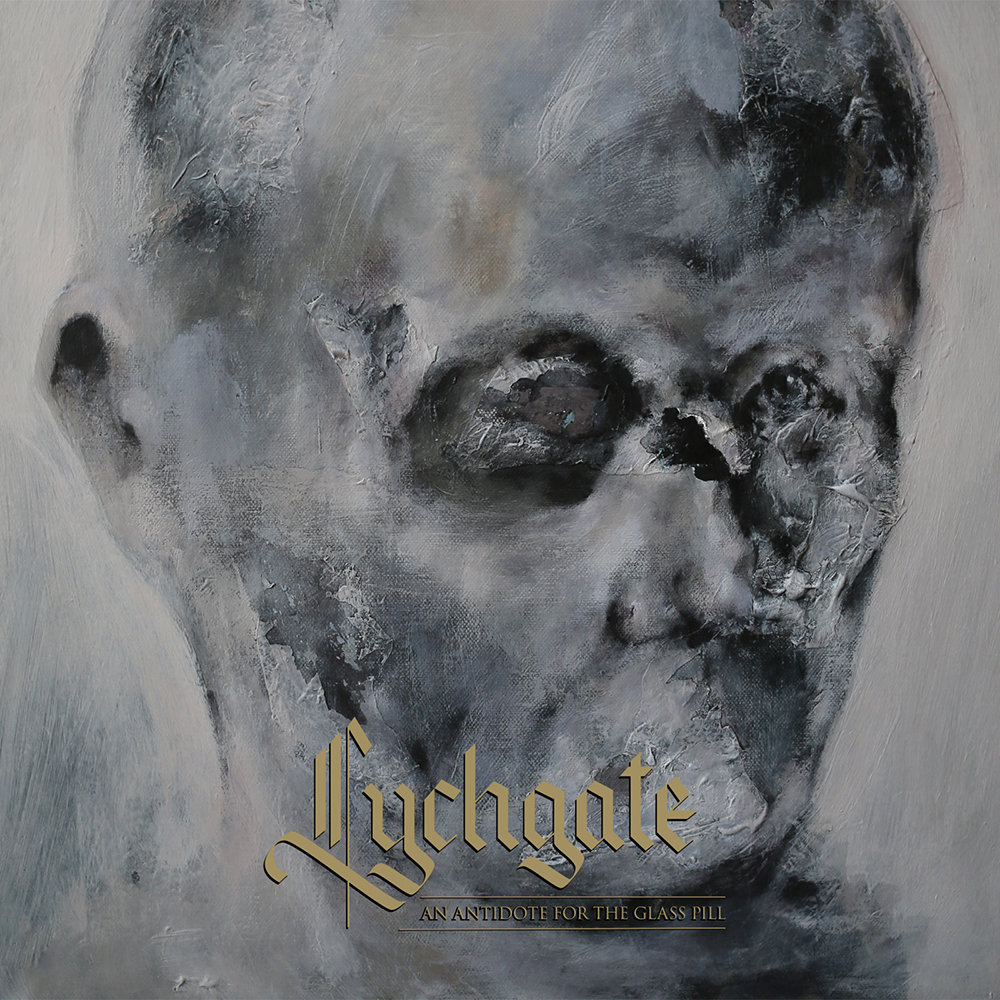Just a few weeks back, UK extreme metallers, Lychgate released their third record. Metal Insider reviewed the epic and, at times, rather bombastic, The Contagion in Nine Steps here. This latest release goes into depth about crowd and mob psychology (so appropriate for today’s global mindset) with insights from both recent and historic writers and philosophers including Hegel, Canetti and Stanislaw Lem. While much of the philosophy of black metal stems from Nietzsche, Lychgate opens the boundaries with their latest and certainly takes on a great deal of risk.
Vortigern (guitar) and I talk a bit of philosophy here:
There is this melting pot of influences here. I can hear some obvious nods to bands like Death, Moonspell and Type O Negative but I’m also getting hints of Cynic, Atheist and some more esoteric 90s metal. What bands do you all regularly listen to and which bands inspire you?
From the bands you mention I like Death and to some extent Type O Negative. From Death I like all the albums, but The Sound of Perseverance always stays in my memory along with Human. In terms of bands I listen to regularly, it’s hard to say – I don’t really have a regular list. So, these are some random classics that sprang to mind without making a longer list – ones that were inspiring, even if you can’t detect them in the Lychgate sound. Firstly, Morbid Angel records, weirdly enough. The ‘Covenant’ album of course, but also ‘Altars of Madness’ – those are two favourites. Another record I like to come back to now and then is Nocturnus – ‘The Key’. Also, the first Decide album, Bathory ‘Hammerheart’ and ‘The Return’, Infernäl Mäjesty ‘None Shall Defy’, Coroner ‘Punishment For Decadence’, Absu ‘Barathrum: V.I.T.R.I.O.L.’, Mortuary Drape ‘All the Witches Dance’, the first Immolation album ‘Dawn of Possession’, Disembowelment ‘Transcendence into the Peripheral’, My Dying Bride ‘The Anger and the Dark River’, Mayhem ‘De Mysteriis Dom Sathanas’. All the Unholy albums and all from Emperor (of course). Finally, Nokturnal Mortum ‘Nechrist’ – really unique and underrated.
From the nowadays scene I have to take my hat off to Gorguts especially.
I know this record was heavily influenced by Stanislaw Lem’s The Invincible. What is it about the novel that compelled you to incorporate it into your latest release?
‘The Invincible’ was the “eureka” moment for this album’s lyrical themes because, like ‘Solaris’, I was so captivated by its concepts and it inspired me to explore further ideas. Here we have examples of human questions in the context of something other-worldly. I think this makes the metaphors more powerful in a way. It would later serve as an analogy for crowds and the idea of social structures and contagion. In the novel we are presented with a planet where micro-machines came to evolve and self-replicate, being the only survivors. They could assemble into large swarms displaying complex behaviour from self-organisation and administer electromagnetic interference when threatened, which resulted in most of the visiting researchers becoming amnesiacs. The story is essentially an imaginary experiment to demonstrate that evolution may not necessarily lead to dominance by intellectually superior life forms. The swarm represents of course the idea of superiority in numbers – it is untouchable – it has no fear of being touched – it is one entity and individuals cannot defeat it.
Other themes that run through the record come from the work of Canetti. Canetti was known for writings on mob violence and crowd behavior including the power congregations. What is it about Canetti that appeals to you? Are we living in a world controlled by mob power, and if so, who are the controlling mobs?
Firstly, we need to distinguish between crowd types and mob types. For example, religion shows crowd behaviour, but is not mob-like. Secondly, it’s important to remember that in relatively recent history, e.g. 19th/20th century, the amount of people writing on this topic was somewhat limited. That has changed to some extent now with research becoming more and more diverse. However, for the 20th century Canetti was a good choice of writer to contrast with, say, Le Bon. His work ‘Crowds and Power’ is contextually important because, being from 1960, it has the benefit of being able to conceptualise the crowd not only in Nazi Germany, but right back to anthropological beginnings. The style of writing in Canetti is interesting, as it is suggestive, and the content a good mixture of “poetical” insights (e.g. comparisons to nature and biological systems) and historical fact expressed more often in metaphorical guises, using a very wide breadth of examples from religion (e.g. the Skoptsy, or Arafat Pilgrims and Islam, Catholicism etc.) and war (e.g. the 19th Dynasty of Egypt, or Assyrian Empire and European warfare) to parliamentary systems, socialism, tribes and so on. Furthermore, it is a collective crowd theory which reflects to look at modern times as representative of the uncounted millions, where the crowd are taken more seriously than ever before.
Does the crowd cause the leader, or does the leader cause the crowd? Generally, I would say we live in a world controlled by the power of the crowd. I don’t enjoy answering such a question about who’s doing the controlling. It puts me in an uncomfortable position, which straddles the border with conspiracy theories and so on. One of the founders of the EU, Altiero Spinelli, and the ‘Ventotene Manifesto’ represent quite a good example of this “uncomfortable” topic for European contexts; in light of political regimes which have been very turbulent and suspicious in recent years. I urge anyone to look it up and think about it if they wish. Also, what about the last presidential election in the USA? Who assisted in its various stages and directions? I won’t answer that question, but in the Internet age there are a number of things that can be done to control and/or influence people. Suppressing (or filtering) information is certainly one of them. How much can we control what information we ingest? Are we in control of our biases? We live in a world where the contagion, whatever that is, spreads through the crowd in different ways. All the crowd needs is an impetus and it can come from anywhere – a single individual even.
Are there mobs in extreme metal? If so, who are these mobs and are these mobs a good thing or a bad thing for the global scene?
Of course, if by mobs we are thinking of people like packs. Pack behaviour is always bad for the metal scene. It means something generic and dull might get 1 million hits, and something else fresh and interesting gets 5k hits. There are matters of taste in this, but you know what I mean. It raises the whole question of whether bands normally get the attention they deserve, given that they exist for long enough.
Can you tell me a bit about the story behind “The Contagion?” both in terms of the lyrics and the nearly 9 minute music journey you take the listener through? There are points in the song that are disharmonious yet also somewhat eerily choral. It’s almost like an entire story and musical work in just one track.
This track has variations on three kinds of theme. For example, the music box part at the end, if anyone noticed, is the same melodic motif as in the two choruses earlier in the track. The middle section with snare marches is also a variation on the first riff you hear after the first chorus. I prefer to think of it as a journey, which includes some desolate parts. For example, the slow section after the middle section for snare marches is like another realm. The lyrics allude to the Canetti work spoken about above, focussing on a few different ideas; particularly the fire metaphor from the chapter on crowd symbols (the sea, rain, rivers, forest, corn, wind, sand, the heap, stone heaps, treasure).
The philosophy of Hegel is cited an influence for you. Do you fall on the left side of the right side of Hegelianism and does this sharply contrasting dichotomy of Hegel’s legacy influence any of your work?
Hegel was an influence for one track on the album. So, it contributed as an influence towards the album concept, rather than as a significant influence overall. Considering the political context of Prussia at the time of Hegel, I have the benefit of hindsight here, so I can say that I am therefore more likely to fall on the Left. However, as with many matters of philosophy, or indeed politics, I normally find myself sympathising with a mixture of ideas falling on both sides.
Lychgate clearly are willing to push the philosophical boundaries of black metal, which is the sign of a healthy, developing overall scene. The music, of course, works in tandem with the lyrics and content quite well to give the listener a challenging yet quite eye opening listen.
The Contagion in Nine Steps can be purchased via Blood Music here.











